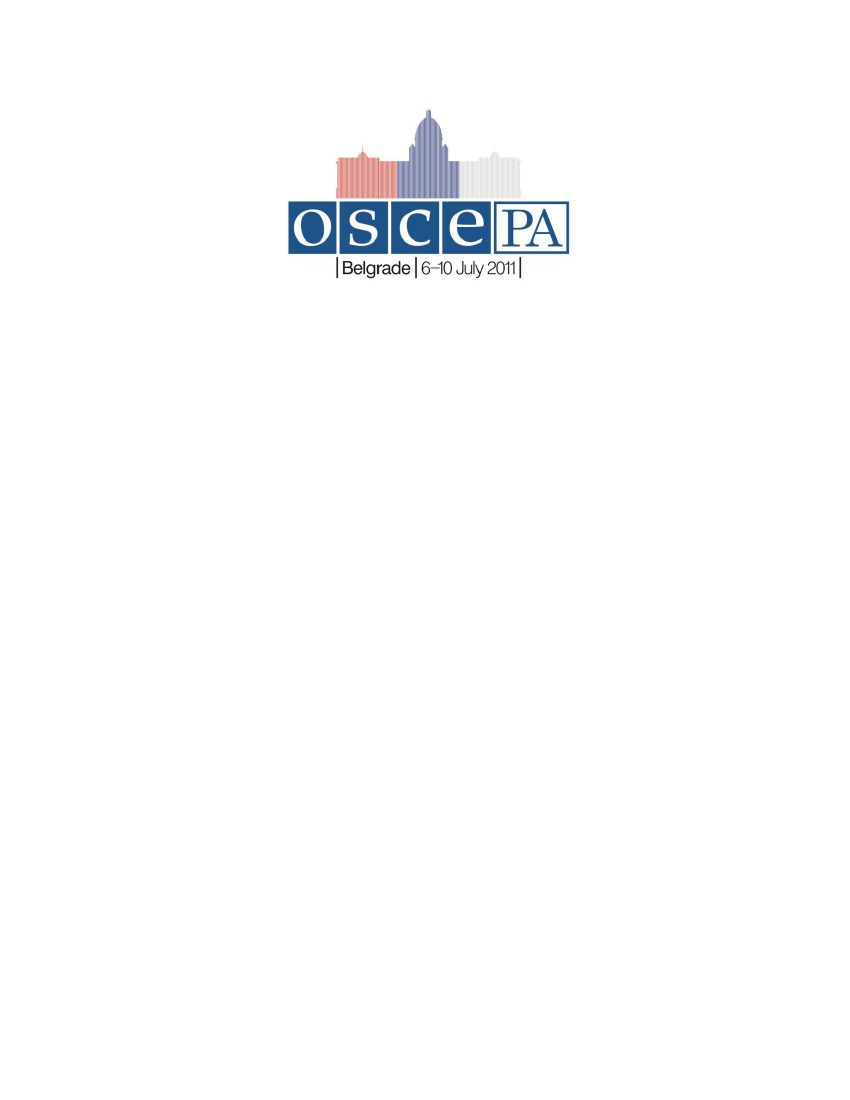OSCEs parlamentariske Forsamling 2010-11 (1. samling)
OSCE Alm.del Bilag 47
Offentligt
SC (11) SI 25 EOriginal: ENGLISH
SUPPLEMENTARY ITEMDRAFT RESOLUTIONON“GENDER, MIGRATION AND ECONOMIC INDEPENDENCE”
Principal SponsorMs. Hedy FryCanada
BELGRADE, 6 JULY TO 10 JULY 2011
DRAFT RESOLUTIONGender, Migration and Economic IndependencePrincipal Sponsor: Ms. Hedy Fry (Canada)
1. Recognising that equal opportunities for women and men and the full and equal enjoymentof their human rights by women are essential to peace, sustainable democracy, economicdevelopment and prosperity and, therefore, to security and stability in the OSCE region,2. Recognising that at the UN Beijing Conference in 1995 women’s rights were recognisedas de facto human rights,3. Noting that in some OSCE participating States women still do not participate fully in theeconomic, social, cultural and political lives of their countries,4. Acknowledging that in many OSCE participating States, women are still the poorest andmost vulnerable members of society,5. Being aware that poverty is a key indicator of political and social instability, and that itaffects men and women differently,6. Noting that the full potential of women’s economic activities and their contribution to theeconomic prosperity of their families and countries is unrealised and underutilised acrossthe OSCE region,7. Acknowledging that women share responsibility for income generation and economicstability and that their income has a multiplier effect given that it is more likely to beinvested in their families and communities,8. Concerned that women’s economic dependence on men, especially in times of economicdifficulty and crises, increases their vulnerability and susceptibility to violence, abuse,oppression, isolation, exploitation and discrimination, domestically or socially, andpotential as victims of deliberately submissive foreign bride arrangements and illegitimateeconomic activities such as prostitution and human trafficking,9. Acknowledging that gainful economic opportunities, economic empowerment, migrationeducation and training are legitimate avenues and solutions by which women and girls canreduce their impoverishment, achieve economic independence, improve their livingconditions and realise their full economic potential,10. Noting the variation in the prominence and success of women entrepreneurs acrosscountries of the OSCE region and that women entrepreneurs are more likely to facechallenges relating to discrimination regarding access to and control over such economicand financial resources as loans, credit, financing, property and inheritance rights, as wellas barriers pertaining to social norms and traditional values, the undervaluing of women’s1
potential and abilities, inadequate business skills and education and inadequate access tomarkets,11. Acknowledging that the experiences and disadvantages of female migrants, labourers andentrepreneurs are different than those of men, due to their status, nature of theemployment sectors in which they are typically represented, type of educationalrequirements, limited legal channels for female migrant workers, and exclusion from theprotection of sound labour legislation,12. Noting that gender-based analysis has shown that female workers and migrants are morelikely to be underrepresented in senior positions of responsibility and management, paidlower wages, work longer hours, have less job security and face increased sexualharassment, abuse, discrimination than male counterparts,13. Recognising the various types of female migrants, such as permanent and temporary,labour and family class, low skill and high skill, refugees and asylum seekers, documentedand undocumented, young and old, each present its own opportunities and challengesrequiring equally diverse policy responses,14. Concerned that the disproportionate number of migrant women employed in economiclabour sectors, such as domestic and care services, garment manufacturing, hospitality,and agriculture, remain unregulated in some countries,15. Affirming the economic and social benefits resulting from legal and orderly migration bywomen, including labour migration, and of actively promoting possibilities for women inthe labour market and as business entrepreneurs for their own benefit, and also for thebenefit of their families and their country’s economic potential,16. Noting that wider access to affordable and reliable justice on the part of vulnerable groupssuch as female migrants and women economically dependent on their spouses is animportant avenue for ensuring their rights are respected, particularly under circumstancesof marital dissolution, custody of children, employment discrimination and harassment,and equity of pay for equal work,The OSCE Parliamentary Assembly:17. Reiterates and commends past OSCE PA resolutions on gender, migration and economicopportunities, the 2004 Action Plan for the Promotion of Gender Equality, and the work ofthe Office of the Coordinator of OSCE Economic and Environmental Activities, theOSCE Special Representative and Coordinator for Combating Trafficking in HumanBeings, the OSCE Gender Section and OSCE field missions in promoting gendermainstreaming and regarding support for projects and seminars addressing genderequality, migration, labour, economic opportunities and skills, and data collection,entrepreneurship and economic empowerment;18. Stresses the need to raise awareness about the untapped potential of women in alleconomic sectors;2
19. Affirms the rights of women to increased economic autonomy, including control over theirearnings, legal migration opportunities, safe and secure recruitment procedures, access tojudicial proceedings, fair remuneration and decent working conditions, including the rightto negotiate better terms of employment;20. Notes the principle that maternity/paternity policies and childcare programs are keyelements in promoting equal employment opportunities and responsibility-sharingbetween women and men and enhancing the economic prosperity of women and theirfamilies;21. Encourages OSCE participating States to build liaisons and strong relations with non-governmental labour and business sectors to promote training opportunities, education,employment and pay equity for women in the labour market by way of various programs,policies, legislative and financial/tax incentives; Encourages mentoring relationships andcooperation at the national and regional levels among women’s organisations relating tolabour, migration and entrepreneurship, including trade unions, non-governmentalorganisations, business associations, that focus on training and counselling, exchanginggood practices regarding women’s entrepreneurship, developing associations andnetworks of women entrepreneurs, identifying priorities for economic reforms and policiesthat support women’s economic independence and prosperity, enhancing employmentopportunities, and support and protection of female migrant workers and entrepreneurs;22. Calls upon participating States to adopt legislation that creates an enabling environment toprovide equality of economic and employment opportunity for men and women, ensureequal access for women and girls to education, training and equal wages; promotes genderbalance in senior positions of responsibility and management; improves workingconditions and provides equal access to benefits including child care;23. Calls upon participating States to adopt policies that facilitate economic opportunities andindependence for women; including promoting growth of female entrepreneurship,establishing non-burdensome licensing and taxation regimes, developing gender sensitiveprogrammes that facilitate access to finance, education and training and development oflocal, national and regional business associations;24. Calls upon participating States to adopt programs and strategies that implement women’srights regarding equality of economic and employment opportunity, education, trainingand wages;25. Urges participating States to enhance their capacity for reliable collection, analysis anddissemination of sex-disaggregated data and research on migration, employment andeconomic independence according to standardised methodology, and to consider issuinggrants or other means of supporting non-governmental organisations to collect, analyseand disseminate sex-disaggregated data and research;26. Encourages participating States to exchange best practices concerning gender, migrationand economic independence of women in order to develop more effective policies inbusiness support, education, labour regulation, and identify priority areas for furthercapacity building.3
PROPOSED AMENDMENT to the DRAFT RESOLUTIONon“GENDER, MIGRATION AND ECONOMIC INDEPENDENCE”
[Set out text of Amendment here:]
Principal Sponsor:Mr/MrsFamily Name inCapital LettersCountrySignature
Co-sponsored by:Mr/MrsFamily Name inCapital LettersCountrySignature
4





